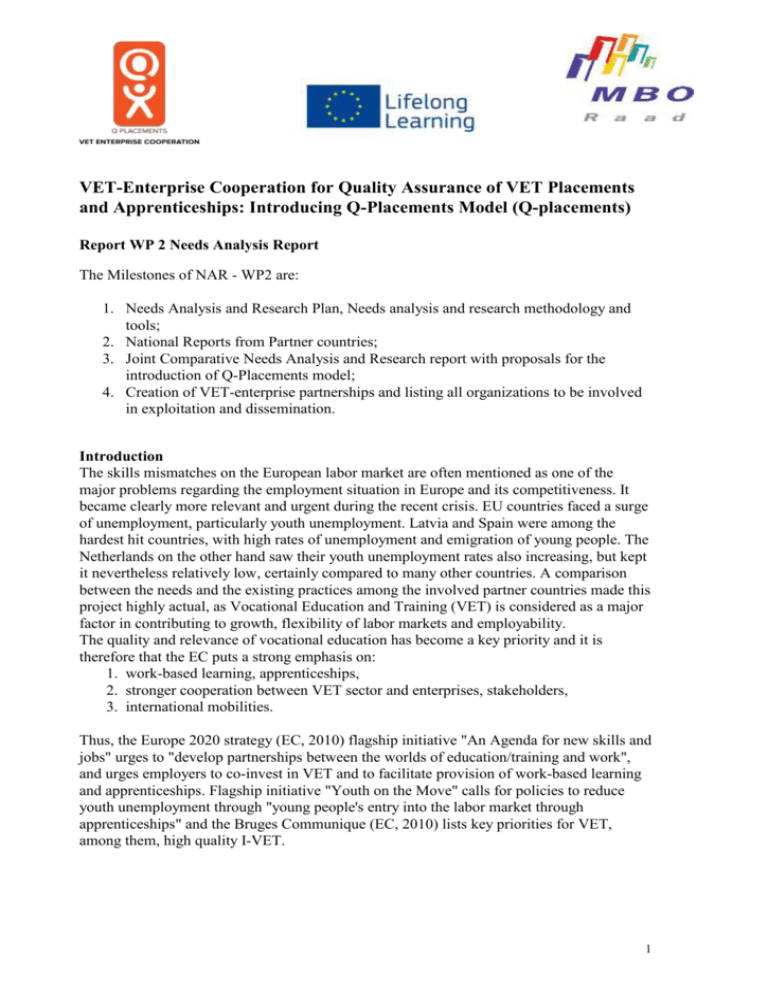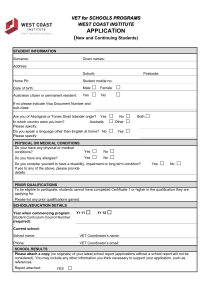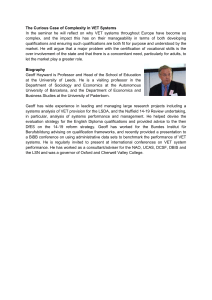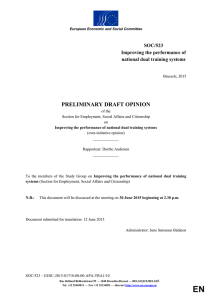Needs Analysis and Research report
advertisement

VET-Enterprise Cooperation for Quality Assurance of VET Placements and Apprenticeships: Introducing Q-Placements Model (Q-placements) Report WP 2 Needs Analysis Report The Milestones of NAR - WP2 are: 1. Needs Analysis and Research Plan, Needs analysis and research methodology and tools; 2. National Reports from Partner countries; 3. Joint Comparative Needs Analysis and Research report with proposals for the introduction of Q-Placements model; 4. Creation of VET-enterprise partnerships and listing all organizations to be involved in exploitation and dissemination. Introduction The skills mismatches on the European labor market are often mentioned as one of the major problems regarding the employment situation in Europe and its competitiveness. It became clearly more relevant and urgent during the recent crisis. EU countries faced a surge of unemployment, particularly youth unemployment. Latvia and Spain were among the hardest hit countries, with high rates of unemployment and emigration of young people. The Netherlands on the other hand saw their youth unemployment rates also increasing, but kept it nevertheless relatively low, certainly compared to many other countries. A comparison between the needs and the existing practices among the involved partner countries made this project highly actual, as Vocational Education and Training (VET) is considered as a major factor in contributing to growth, flexibility of labor markets and employability. The quality and relevance of vocational education has become a key priority and it is therefore that the EC puts a strong emphasis on: 1. work-based learning, apprenticeships, 2. stronger cooperation between VET sector and enterprises, stakeholders, 3. international mobilities. Thus, the Europe 2020 strategy (EC, 2010) flagship initiative "An Agenda for new skills and jobs" urges to "develop partnerships between the worlds of education/training and work", and urges employers to co-invest in VET and to facilitate provision of work-based learning and apprenticeships. Flagship initiative "Youth on the Move" calls for policies to reduce youth unemployment through "young people's entry into the labor market through apprenticeships" and the Bruges Communique (EC, 2010) lists key priorities for VET, among them, high quality I-VET. 1 The concept of Quality in VET focusses on: 1. quality assurance which implies national quality assurance frameworks for VET providers which apply to work-place learning and which is compatible with EQAVET; 2. quality of teachers, trainers and VET professionals; 3. labor market relevance, enhanced through cooperation between schools and enterprises, social partners and stakeholders. The importance of WBL was once again stressed by the Commission initiative "Rethinking Education" (EC, 12/2012), that urges to promote work-based learning "including quality of apprenticeships” and recently through the “European Area for Apprenticeships” – initiative. The project Q-placements is trying to deliver a contribution to the quality of the work based parts of VET by transferring good practices from an earlier Leonardo da Vinci project to countries that were not earlier involved, whilst taking on board other good practices and the needs of schools, companies and stakeholders. These three groups were consulted in Spain, Latvia, Slovenia and the Netherlands through interviews and questionnaires. In the next Chapter the most emerging messages from the consultation, including some ‘provisional’ remarks about the situation in the partner countries will be described. A full description of the situation in the partner countries can be found in the separate country reports. Finally this Needs Analysis Report will provide some preliminary conclusions and recommendations Some key features regarding the role of WBL in the VET systems of the partner countries. Latvia: After the reforms of 2010, more emphasis is put on the role of in company training (WBL), but finding enough companies to provide quality placements remains difficult. It appears, that good intentions of legislation to integrate WBL more in VET training are not always in keeping with the reality. There are tripartite agreements (company, school, student) for the work placement periods, but these are considered as too general and often only considered as words on paper, without too much influence on the quality of the work placements. This tendency is strengthened through the lack of companies, which makes that schools cannot ask too much. There is no system for the accreditation of learning companies. 2 The Netherlands There has been a lot of concern about the quality of work placements in recent years, resulting among other things in a work placement protocol (BPV protocol), that clearly defines what might be expected from all actors. The importance of work placement is not under discussion and it exists in both the school based VET system (BOL), and the work based VET system (BBL). As a result of the crisis it has become more difficult to find enough companies, mainly in the work based system. This showed on the other hand the strength of the system as the school based system was generally able to absorb those students who couldn’t find a company in the work based system. WBL is also an integrated part of the school based system (min. 20%), but less pronounced and generally cheaper for the employers. In the Netherlands, students generally absolve more than one work placement in order to broaden their orientation. Slovenia WBL is an integrated and compulsory part of VET. The duration differs from the program, but the content is always drawn up by companies and schools together. All tasks for the students need to contribute to the acquisition of the defined learning outcomes and are laid down in a contract between company - school – student. There is a quality control mechanism (by the Chambers) that looks to the provisions of a learning company and to the range of competencies that a student can acquire in a company for a certain VET program. In case that this is not covering the entire range, the student needs to go to another company in order to train the missing competencies and to make sure that all required competencies are covered. Companies need to be recognized learning companies. All together the situation of WBL has many similarities with the situation in The Netherlands. In spite of this (or maybe due to this) the legislation and the willingness/availability of companies are main problems in Slovenia. Spain Spain has a rather de-centralized education system (autonomous communities) with a number of links to national bodies like the National Reference Point (NRP) and the National Institute for the Evaluation of the Education System. IVET depends on the Ministry of Education, Culture and Sport, whilst the more on direct employment focusing sorts of VET 3 (CVET) depend on the Ministry of Employment and Social Security. In theory the Spanish system is based on a systemic view that includes all types of training and is closely linked to the labor market, but in practice both subsystems are suffering from insufficient articulation. It is remarkable that several laws and decrees are drawing up impressive lists of quality factors, without mentioning WBL. From the interviews in the four partner countries, the gap between the companies and the schools appears to be the largest in Spain, as the importance of attuning the school programs with the company needs was rated very high. Apparently something that is not currently happening. According to the interviews with the schools time pressure is a very important reason for insufficient contacts with the companies. Emerging messages from the Needs Analysis Reports among schools, employers and other stakeholders Messages schools: • Providing guidance from schools (school mentors or supervisors) is in all countries considered as important. • Role of the company tutor is also considered as very important in all countries • Rewards for companies (tax deduction etc.) are in most countries considered as important , but not so much in The Netherlands. • In general, it appears to be difficult to find enough companies for Quality WBL, a situation that has deteriorated by the current crisis. • Time to select companies and to cooperate with the tutor is a problem in Spain • The legislation and the willingness/availability of companies are main problems in Slovenia • Assessing the learning outcomes from WBL by the schools is considered as less important. 4 Messages employers: • Support from the sending schools and the motivation of the students are in all the countries considered as highly important for taking apprentices or students on board of the companies. • Companies in all countries are highly motivated to take apprentices or students on board, but they experience apparently certain barriers. • The costs issue has the highest scores in Latvia followed by Slovenia, as it is demonstrated by the questions about the rewards for a company and the negative consequences of the salary costs for an apprentice. • Salary costs are not rated very high as a barrier in the other countries • In Slovenia WBL is considered as an appropriate way to select future staff. • The value of WBL for creating a better skills match on the labour market is rated low in the Netherlands, certainly compared to the other countries Messages stakeholders: • All countries stressed the importance of qualified company tutors and the support from the sending schools and the role of their teachers and/or mentors. • Slovenia appears to be the only country that considers EQAVET as important. • Slovenia showed also a high score regarding the importance of different companies for the WBL part and the willingness to invest in the future of the students. • Spain clearly showed a gap between the companies and the schools as they rated the importance of attuning the school programs with the company needs very high. Apparently something that is not currently happening. 5 Some conclusions and recommendations: Some of the conclusions and recommendations might look like running in open doors, but they remain in spite of that very valid and valuable. • Support from sending schools to the companies during work placement periods are by all partners considered as crucial. Time pressure and legislation problems are mentioned as obstacles for the schools Recommendation: WBL needs to be considered as equally important as learning at schools and should therefore been considered as study time. This is important in cases of a certain minimum of contact hours for students. Precondition for this is the availability of professional tutors in the companies. • Role of the company tutor is in all countries considered as very important. A profound training for these tutors is crucial for the quality, but is difficult to realize due to the time investment, certainly at SME’s. Recommendation: The training for a qualified work placement tutor could be a follow up study in VET (Meister-Geselle in Germany). In the best case it should be offered by the same provider who is offering also the teacher training program, like it is done in Switzerland and as it is the idea with the train- the trainer workshops in the Q-placements project. Also, it should be considered to offer companies certain financial incentives, in case they are investing in high quality training, including qualified trainers. • A clear protocol regarding the roles and responsibilities of all involved partners (schools – companies – students) is very helpful and appreciated by most actors. Recommendation: Striking the balance between the interests of the involved partners is the big challenge in this matter. It is important that students will become prepared for the labour market and for employability instead of having a small training for a vacancy. This is certainly important in IVET. On the other hand, it cannot be expected from companies to act as learning places without any returns in investment. There are several ways of coming to returns in investment, not only financial, but e.g. through an agreement that the student should remain at the company for a certain period after his study. 6 7





